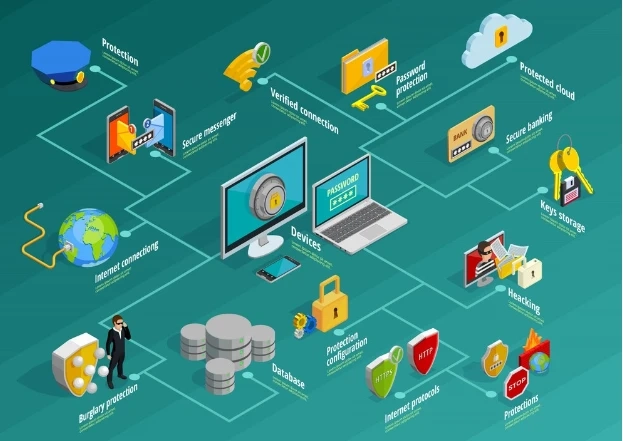Protecting important data from cyber threats is crucial in today's digital world.
As businesses increasingly move their operations online, sensitive information like customer payment details, employee records, and trade secrets are at greater risk than ever. While organizations take many precautions to fortify their networks and systems, one critical security component often gets overlooked: the role of a hardware security module.
A hardware security module (HSM) is a physical computing device that enhances cybersecurity by managing digital keys for strong authentication and cryptographic processing.
Rather than just software running on a general-purpose computer, an HSM is a dedicated physical appliance designed specifically for critical cryptographic functions.
This article will examine how implementing an HSM solution can significantly strengthen your defenses and help keep your data safe from harm.
1. Safeguarding Critical Infrastructure
The best Hardware Security Module provides military-grade Physical and logical protection of infrastructure. They generate, store, and manage cryptographic keys in an isolated environment to strictly prevent access from outside intruders.
While helpful for everyday tasks, HSMs are critical for organizations maintaining society's most crucial systems. Anything requiring ultra-high security or handling massive transaction loads demands an HSM to manage authentication and encryption at web speed.
Such organizations include financial institutions processing daily billions of dollars in payments, telecommunications companies routing private calls over public lines, etc. A single system compromise could have wide-reaching consequences for such operations, so relying on software security is not an option.
Take banking as one example. Financial institutions worldwide depend on HSMs to issue, verify, and revoke the digital certificates that authenticate online banking sessions as truly protected and not falsified. They also generate one-time passwords and transaction signing keys to validate real-time customer requests.
Without an HSM's high-performance, tamper-resistant key management, the complex transactions powering the digital economy would slow to a crawl or halt entirely, which would be a nightmare scenario for everyone.
In healthcare, HSMs use cryptography to restrict access to electronic medical records and enable telehealth software, all while meeting stringent privacy regulations. Wherever data security or service availability is mission-critical, HSMs set the gold standard.
2. Greater Key Protection
Another benefit of HSMs is the stringent protection they provide for digital keys. Keys are the root of trust in any security system. If the keys are compromised, then the whole system comes tumbling down. Software-based solutions do not offer the same level of robust critical security as HSMs.
When keys are generated, stored, and used inside a tamper-proof HSM environment, they are much harder for bad actors to access or steal. This gives organizations confidence that their root keys and credentials always remain secure.
Furthermore, multi-person controls can be implemented on an HSM to require more than one authenticated user to perform sensitive actions like key generation or export. Such robust access controls help reinforce internal security best practices around crucial handling and management.
With keys reliably shielded by HSMs, organizations can deploy public key infrastructures (PKI) and digital signing services with assurance their critical assets are properly defended.
3. Encryption Processing at Peak Performance
While encryption helps secure data in transit and at rest, encryption and decryption operations can put heavy loads on server CPUs. This intensifies in use cases that involve real-time encryption of large volumes of data or many concurrent users.
Using an HSM shifts that encryption work from the relatively slow processors in servers to the high-speed cryptographic circuits built into the HSM hardware.
With the ability to perform several thousand operations per second, HSMs take the computational strain off servers. This delivers faster encryption response times without compromising system resources.
As data processing needs expand, HSM horsepower allows encryption to scale efficiently without sacrificing security. Their integrated crypto processors also offer greater resistance to power and side-channel attacks that aim to extract secrets from devices during encryption. Overall, offloading crypto to HSMs enhances performance and safeguards capacity for future growth.
4. Simplified Centralized Key Management
As digital ecosystems become more complex with cloud deployments, inter-office synchronization needs, an ever-broadening web of user access, and centralized management of cryptographic keys grow increasingly important.
HSMs fill this role through robust key management portals that allow viewing, adding, modifying, removing or exporting keys as business demands.
No longer are individual systems responsible for juggling their keys. Instead, HSMs offer consolidated controls so keys can be issued, renewed and destroyed as policy dictates across diverse platforms from one location.
Changed policies take effect system-wide immediately. This simplifies administration while promoting security best practices like regular key rotation at scheduled intervals.
HSM key managers also enable the creation of detailed audit logs to satisfy various compliance standards that necessitate oversight of all key material operations and access attempts. Their centralized key repositories streamline sharing keys in a controlled manner for applications distributed over multiple servers, desktops and endpoints.
Conclusion
Hardware security modules play an invaluable yet often invisible role in modern cybersecurity. Through specialized physical protection and management of cryptographic keys, HSMs form the backbone, enabling securely encrypted communications, trusted online authentication, and protection of sensitive digital assets worldwide.
This allows individuals, businesses, and entire nations to interact, transact, and rely on technology confidently, and their most private information remains private.



